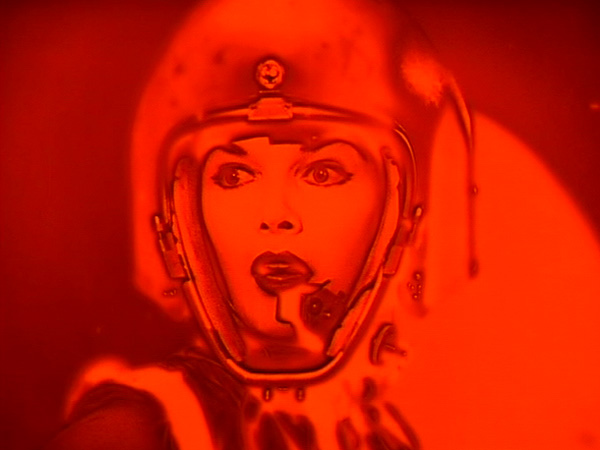Skip to comments.
Russian space general searches for life on Mars
AFP on Yahoo ^
| 8/19/06
| Dario Thuburn
Posted on 08/19/2006 11:59:11 PM PDT by NormsRevenge
KHIMKI, Russia (AFP) - In an anonymous compound next to a suburban Moscow shopping centre a retired Russian army general is planning his next galactic conquest.
Georgy Polishchuk, head of the Lavochkin Association, is preparing an unmanned mission to a moon of Mars that will search for signs of life on the red planet and try to unlock the universe's secrets.
"We have to find life and whether it can be sustained," Polishchuk said, his eyes glinting as his pen drew out the planned route during an interview this month at the installation.
The theory that there may be life on Mars, bolstered by signs that there has been or still is water on the planet, has fascinated scientists and space enthusiasts around the world for more than a century.
The three-year mission is the cornerstone of Russia's bid to reclaim a leading role in robotic planetary exploration after the long lull that followed the glory days of Soviet space exploration.
Russia dusted off exploration plans after US President George W. Bush unveiled an ambitious programme in 2004 to return to the Moon and launch a manned mission to Mars.
Such missions cost "several billion dollars," Polishchuk said. The programme will be funded 75 percent by the Russian state and 25 percent by selling off spare room on board to other space agencies.
The probe, called Phobos-Grunt, will set off in October 2009 from the Baikonur cosmodrome on a Soyuz-2 rocket for Phobos, one of Mars' two tiny moons, to collect soil samples and bring them back to Earth.
Polishchuk's three-year mission also aims to study the origins of Mars' moons and the atmosphere around the red planet, as well as monitor seasonal variations on the surface of Mars.
Phobos-Grunt, the word "grunt" in Russian means "soil," resembles a giant spider and is made up of several globes with an attached drilling device. It weighs a total of around eight tonnes.
"It's a very difficult mission. A very difficult planet," said Polishchuk, 65, referring to the 2003 failure of Beagle 2, a European lander, and an unsuccessful Russian launch for the red planet in 1996.
Two key dates in the history of the Cold War space race tend to overshadow the achievements of the Lavochkin Association: 1961, when the Soviet Union's Yury Gagarin became the first man in space, and 1969, when Neil Armstrong of the United States first set foot on the Moon.
But the association has a proud history of important firsts: on December 2, 1971, Mars-3, a mushroom-shaped object carrying the Soviet hammer-and-sickle emblem, became the first probe to reach the surface of Mars.
The Luna-9 was the first to make a soft landing on the Moon in 1966 and the Venera-8 was the first apparatus to land on the surface of Venus in 1972.
Once the pride of the Soviet space programme and a key missile manufacturer, the association has gone through hard times since the collapse of the Soviet Union, like much of Russia's state sector.
It has not however experienced the massive "brain drain" that has struck other Russian technology firms, said Polishchuk.
"We kept our brains... We have lost individuals, maybe dozens of people," said Polishchuk, who is also a veteran space researcher.
"It's what I call Lavochkin patriotism. We have generations of people working here," the general said.
The average salary at the enterprise is around 15,000 rubles (560 dollars, 430 euros) per month -- cashiers starting out at the Swedish furniture store IKEA across the road earn almost as much -- 12,000 rubles.
But funding problems at the Lavochkin Association are being resolved largely due to renewed state help, as well as projects with other countries such as Canada, China, France, Italy and even the United States.
The fierce Cold War-era competition for new frontiers in space, the general said, has given way to broad international cooperation in the interests of scientific discovery.
"China and India compete for the Moon of course, they want to join the moon club," Polishchuk said with a wry smile. "We've already been there. We've already seen it."
TOPICS: Foreign Affairs; Russia
KEYWORDS: craniorectosis; general; life; mars; russia; russian; searches; space

This NASA Hubble Space Telescope image shows Mars in 2005. In an anonymous compound next to a suburban Moscow shopping centre a retired Russian army general is planning his next galactic conquest. Georgy Polishchuk, head of the Lavochkin Association, is preparing an unmanned mission to a moon of Mars that will search for signs of life on the red planet and try to unlock the universe's secrets.(AFP/NASA/ESA-HO/Fiel)
To: NormsRevenge
"We have to find life and whether it can be sustained"
If you find life, it certainly didn't set up shop just yesterday.
To: NormsRevenge
Mars ain't the kind of place to raise your kids
In fact, it's cold as hell. And there's no one there to raise them if you did.
3
posted on
08/20/2006 12:06:58 AM PDT
by
Triggerhippie
(Plus ça change, plus c'est la même chose.)
To: NormsRevenge; SunkenCiv
what can they do that NASA has not already done?
4
posted on
08/20/2006 12:13:13 AM PDT
by
GeronL
(flogerloon.blogspot.com -------------> Rise of the Hate Party)
To: Triggerhippie
Support the Mars Fighters!
Free them from planetary colonialism and occupation.
It's time we got to the root causes and started understanding their grievences.
Impeach Carl Rove, etc.
/s
5
posted on
08/20/2006 12:14:06 AM PDT
by
tet68
( " We would not die in that man's company, that fears his fellowship to die with us...." Henry V.)
To: GeronL
i'm still looking for big foot lol
6
posted on
08/20/2006 12:14:58 AM PDT
by
StoneWall Brigade
(AMERICA LAND OF THE FREE BECASUE OF THE BRAVE!)
To: Triggerhippie
Mars ain't the kind of place to raise your kids In fact, it's cold as hell. And there's no one there to raise them if you did.Another Bernie Taupin lyric that makes no sense yet survives only by adorning one of Elton John's great melodic ideas.
7
posted on
08/20/2006 12:15:04 AM PDT
by
zarf
To: StoneWall Brigade
The North Korean bigfoot is locally known as wontonkok and is apparently about to be microwaved
8
posted on
08/20/2006 12:19:18 AM PDT
by
GeronL
(flogerloon.blogspot.com -------------> Rise of the Hate Party)
To: tet68
Free Mars Now. Free Mars Now!
9
posted on
08/20/2006 12:19:44 AM PDT
by
GeronL
(flogerloon.blogspot.com -------------> Rise of the Hate Party)
To: NormsRevenge
They'd better be careful:

"All your Russians are belong to us!"
10
posted on
08/20/2006 12:20:46 AM PDT
by
WestVirginiaRebel
(Common sense will do to liberalism what the atomic bomb did to Nagasaki-Rush Limbaugh)
To: GeronL
11
posted on
08/20/2006 12:22:46 AM PDT
by
StoneWall Brigade
(AMERICA LAND OF THE FREE BECASUE OF THE BRAVE!)
To: StoneWall Brigade
That was meant for the NK nuclear test thread.
LOL
12
posted on
08/20/2006 12:37:36 AM PDT
by
GeronL
(flogerloon.blogspot.com -------------> Rise of the Hate Party)
To: GeronL
13
posted on
08/20/2006 12:39:46 AM PDT
by
StoneWall Brigade
(AMERICA LAND OF THE FREE BECASUE OF THE BRAVE!)
To: NormsRevenge
14
posted on
08/20/2006 12:44:09 AM PDT
by
Krankor
(kROGER)
To: GeronL
Well, they managed to send a probe to Mars that, right after it switched on its cameras, saw the largish mini-moon of Mars that was about to destroy it. NASA has never accomplished that. ;')
15
posted on
08/20/2006 1:44:17 PM PDT
by
SunkenCiv
(updated my FR profile on Thursday, August 10, 2006. https://secure.freerepublic.com/donate/)
To: SunkenCiv
NASA usually turns the cameras on early to avoid colliding with rocks and moons, and those radar systems come in handy too.
16
posted on
08/20/2006 3:22:54 PM PDT
by
GeronL
(flogerloon.blogspot.com -------------> Rise of the Hate Party)
Disclaimer:
Opinions posted on Free Republic are those of the individual
posters and do not necessarily represent the opinion of Free Republic or its
management. All materials posted herein are protected by copyright law and the
exemption for fair use of copyrighted works.
FreeRepublic.com is powered by software copyright 2000-2008 John Robinson


